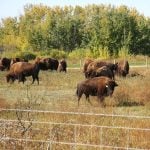Tag Archives Truth and Reconciliation

National Day for Truth and Reconciliation: Acknowledging the past, seeking a better future

OPINION: ‘Cows and plows’ settlement over a broken Indigenous treaty shows the urgent need for more transparent governance

Role for farming seen in economic reconciliation
Communication, listening and taking that first daunting step are called key to moving toward economic reconciliation
Glacier FarmMedia – The dictionary definition of reconciliation is “restoration of friendly relations” and “the action of making one view or belief compatible with another.” When it comes to truth and reconciliation with Indigenous peoples in Canada, it goes beyond a few days of recognition, advocates say. It’s about leaving space for economic reconciliation too, […] Read more
Responsibility seen as key component of reconciliation
A First Nations leader says all Canadians, including farmers, must focus on taking action to correct past wrongs
Glacier FarmMedia – Cadmus Delorme, chief executive officer and partner of OneHoop Consulting, says society has inherited this moment in history, and it includes responsibility for truth and reconciliation with Indigenous peoples and communities. Responsibility is not to be confused with blame or creation of harm, he said, while speaking at the Protein Industries Canada […] Read more
Expedited ag claims compensate First Nations
Canada’s treaties promised First Nations a way to participate in agriculture, but those commitments were rarely met
The National Day for Truth and Reconciliation will take place Sept. 30. REGINA — Agriculture is very much an ongoing part of Canada’s truth and reconciliation process. The announcements that First Nations are signing what are colloquially known as “cows and plows” agreements represent that effort. Related story: Responsibility seen as key component of reconciliation […] Read more
Reconciliation can happen,one relationship at a time

Potential Indigenous labour force should not be ignored

First Nations producers hope for farm comeback
Indigenous communities have few ties to farming, but those in the business say it’s important to try to turn that around
This is part of an occasional series looking into the pools of human talent within Canada’s population that could help fill the growing labour shortage that is crippling many farms. LANGHAM, Sask. — Like a lot of young men in rural communities, Kobe Wolf Child is proud to be a ranch hand. It’s the perfect […] Read more
Reconciling painful past may create hope






